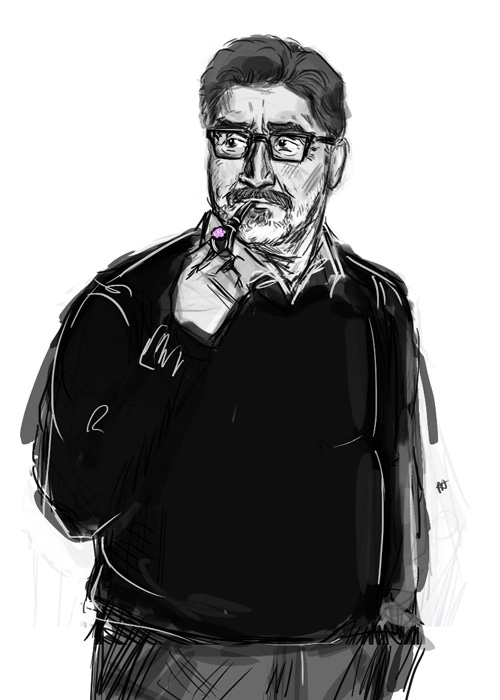The Poetry of Three Pines
Poetry is sprinkled throughout Penny's books, each featuring a few lines or a dozen or a hundred
Hi friends,
We’re so happy to share this lovely piece from Neal Thompson, author of six books, about Louise Penny’s use of poetry. Neal also writes Blood and Whiskey, a great newsletter about crime fiction and cocktails.
We’re excited to share more fan art from Maria and Blue Cat with Glasses.
— Elizabeth and Aya
P.S. Aya is attending the “Three Pines” tomorrow! More details to come.
There’s a micro scene early in Kingdom of the Blind, the 14th Inspector Gamache novel. It takes place at the bistro run by Olivier and Gabri, the cozy Three Pines village hub where countless scenes and conversations take place across the soon-to-be eighteen books in the series. This particular scene features the famous and famously cranky poet Ruth Zardo, sitting with her duck, Rosa, having a lunch of scotch and potato chips.
Ruth looks outside, sees kids riding toboggans downhill onto the village green, then turns to the notebook before her and writes:
Sharp as thin ice
the clear cries of children pierce the sky…
On the sofa beside her, Ruth’s pet duck mutters “fuck, fuck, fuck,” then plucks a chip from Ruth’s bowl. Ruth scribbles a few more lines:
Or in the snow-lapped country church,
kneeling at last to pray
for what we could not have.
There’s no narrative purpose to the poem. It’s not relevant to the plot, just a lovely moment, one of many displaying Louise Penny’s obvious love of wordplay and poetry. As any longtime Penny reader knows — and as I’ve come to appreciate as I’ve plowed deeper into the series in recent months — poetry is sprinkled throughout her books, each featuring a few lines or a dozen or a hundred. Many of them are “written” by the whiskey-drinking and often wicked Ruth Zardo, boozy and belligerent, cooky and cantankerous. Penny calls her: “A gifted poet. One of the most distinguished in the nation. But that gift had come wrapped in more than a dollop of crazy.”
I had always assumed Penny was a closet poet and that Ruth’s poems — and the many others that appear throughout the series — were penned by Penny. In fact, most are borrowed, with permission, from other writers. Many of Ruth’s poems were written by Penny’s friend and fellow Canadian author, Margaret Atwood.
It’s an interesting device and an interesting choice, since I’ve found Penny to be quite the undeclared poet on her own. I’ve double- and triple-asterisked many passages in her books, lines that I consider to be odes to the darkness of murder and death. There are two paragraphs in Still Life in which she explores how a death in the country, unlike the nighttime tragedies of a city, “comes uninvited, during the day.” She riffs on how fishermen, skiers, skaters, swimmers, hunters and drivers meet their unexpected demise. We then meet Matthew Croft, a hunter and road department worker, who has witnessed his share of fatal road accidents, after which his “bruised heart and brain would go home to poetry.” His favorite poet is Ruth Zardo, whose poems he’d learned by heart.
We learn that Gamache himself is a fan of Ruth’s poetry, which he regularly recites. In time, Ruth and Gamache develop a teasing relationship, but when they first meet, in Still Life, Ruth is (briefly) a murder suspect. During an interrogation, Gamache quotes her:
“Who hurt you, once, so far beyond repair? That you would meet each overture / with curling lip?” The poem ends: “It was not always so.”
Ruth replies, “You really think throwing my own poetry at me’s going to do it?”
The poem that Gamache quotes was written by Marylyn Plessner, whose book Vapour Trails was published after her death in 2000. It appears many throughout the series, becoming a mantra of sorts for Penny’s interest in hurt and healing and recovery.
I’m FINE
In book two, A Fatal Grace, we learn that Ruth’s first book of poems, published years earlier, had stunned residents of Three Pines, who couldn’t believe “such an apparently brittle and bitter woman could contain such beauty.” Ruth later won a Governor General’s Award, Canada’s most prestigious literary honor (which Penny was awarded in 2013). Early in the series, we’re introduced to Ruth’s best-known book, I’m FINE, which Gamache learns stands for Fucked Up, Insecure, Neurotic, Egotistical.
One poem from that book:
Well, some children are sad
but some get over it.
Count your blessings, better than that,
buy a hat. Buy a coat or pet.
Take up dancing to forget.
Clara Morrow reads those lines and wonders aloud (to bookshop owner Myrna): “How does she do it? She’s just an old drunk?”
Myrna replies, “You thought that about God, too.”
Clara keeps reading…
Forget what?
Your sadness, your shadow.
whatever it was that was done to you
the day of the lawn party
when you came inside flushed with the sun,
your mouth sulky with sugar,
in your new dress with the ribbon
and the ice-cream smear,
and said to yourself in the bathroom,
I am not the favorite child.
Those lines come from Margaret Atwood’s poem, “A Sad Child.” (Other poems that appear in the series were written by lesser-known poets: Ralph Hodgson, Mike Freeman, Liz Davidson, Robert Service, Stevie Smith.)
Also in A Fatal Grace, Clara reads a Ruth poem about a moth: “You were a moth / brushing against my cheek / in the dark. / I killed you / not knowing / you were only a moth / with no sting.” Clara observes: “They’re almost all about death, or loss … I hadn’t realized that. Most of Ruth’s poems are about death.”
Clara realizes that cranky old Ruth got all her bitterness out in her poetry.
Bitterness, Sorrow and Goodness
I believe Penny is doing something similar. Not bitterness, maybe, but sorrow.
Penny has written on her website that if fans take one thing from her books, she hopes that it is a belief that she and Gamache share: “Goodness exists.” Penny has also said that when she writes, “I am surrounded by poetry books and cookbooks” and that the poetry in her work supports that notion, that goodness exists.
“It’s always been at the heart of all the books from ‘Still Life’ on,” Penny said in a 2016 interview. “I use a lot of poetry in my books, and a lot of the poetry I use in the books never actually shows up in the books; they are themes.”
Penny has also explained that she pays for permission for all the poetry excerpts, sometimes handsomely — “and rightly so,” she says on her website. But when she asked singer-songwriter Leonard Cohen for permission to use a few lines from his song “Anthem,” he offered it for free. Those lines — an ode to goodness existing, to hope in the dark — first appear in A Fatal Grace (book 2) and later provide the title for book 9:
Ring the bells that still can ring
Forget your perfect offering
There’s a crack in everything.
That’s how the light gets in.
From a Poem?
Penny decorates her mysteries with many random riffs and asides: history, politics, art, nature, science, weather, food, family, philosophy, music, plus regular odes to literature and her favorite authors: W.H. Auden, Agatha Christie, to name two. (She’s also dropped a few nods to Inspector Clouseau. I burst out laughing when I read Gamache asking, a la Clouseau, of Ruth’s pet duck, “Do you have a lee-sense for that minky?” Elsewhere, Ruth razzes Gamache: “No need to get excited, Inspector Clouseau.”)
But to me, the most consistent component is poetry. It’s not an aside but a key ingredient. It anchors her stories. So does the dark beauty and cynical humor of Ruth.
Another poem from Ruth’s book I’m FINE makes appearances in multiple novels:
Long dead, and buried in another town,
my mother hasn’t finished with me yet.
In A Fatal Grace, gathered with others at the bistro, Ruth recites those lines. They sound familiar to Gamache, who asks: “From a poem?”
“You think?” Ruth replies – “with a snarl” – then finishes the poem:
‘When my death us do part
Then shall forgiven and forgiving meet again,
Or will it be, as always was, too late?’
Gabri jokingly asks Ruth for more of her poetry: “I don’t feel quite suicidal enough.”
But Gamache is awed by Ruth, telling her, “Your poetry is remarkable.”
Penny tells us Ruth “looked more stricken by his kind words than Gabri’s insults.”
“Fuck off,” she tells the inspector, then shoves him and marches out the door.
Ah, Ruth.
Neal Thompson is a journalist and the author of six acclaimed nonfiction books, including The First Kennedys, A Curious Man, Driving with the Devil, and the memoir Kickflip Boys. A former newspaper reporter, he has written for the New York Times, the Washington Post, Esquire, Outside, Men’s Health, Vanity Fair, the Wall Street Journal and more. Neal has appeared on NPR, PBS, The Daily Show, CNN, the History Channel, and ESPN. He lives in Seattle with his family and publishes the Blood & Whiskey newsletter (crime fiction and true crime book reviews, author interviews, cocktails, playlists).
Notes from Three Pines is a short-run newsletter run through Substack celebrating and exploring Louise Penny’s Inspector Gamache books. Love Gamache or Ruth’s duck Rosa? Reply to this email, leave a comment or email notesfromthreepines@substack.com.
If you’re reading this on Substack or were forwarded this email, and you’d like to subscribe, click the button below.
Disclosure: We are affiliates of Bookshop.org and will earn a commission if you click through and make a purchase.






I too have read and reread Louise Penny’s books, making notes and researching the poetry she living weaves into her stories. I love Ruth...I think I have an inner Ruth who inspires me to write...wish I had an inner Clara and could paint...but this essay was wonderfully insightful. Thank you!!
I've long Ruth Zardo's poetry and am so glad to learn the sources of it, including the author herself. I'm intrigued that Penny says she writes "surrounded by poetry books and cookbooks." I wonder which cookbooks inspire her frequent references to food and what she cooks herself. Maybe we'll read about this in a future edition of this delicious newsletter.